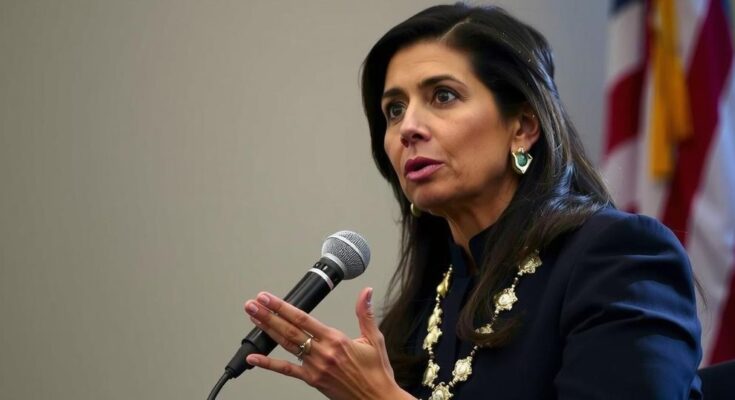Former Congresswoman Tulsi Gabbard’s nomination by Trump for the director of national intelligence faces scrutiny over her past views on Syria and criticism of U.S. foreign policy. Concerns among national security officials highlight risks to intelligence cooperation with allies, especially in light of her anti-war stance and associations with controversial narratives regarding Russia. As Gabbard navigates her Senate confirmation, her nomination could stir significant debate regarding U.S. foreign relations and national security.
Former Congresswoman Tulsi Gabbard, nominated by President-elect Donald Trump for director of national intelligence (DNI), faces intensified scrutiny due to her controversial past positions on Syria and Russia. Critics argue that her acceptance of a meeting with Syrian President Bashar al-Assad in 2017 and her statements regarding Russia’s actions during its invasion of Ukraine could hinder the effectiveness of U.S. intelligence relations with allies. Gabbard, a lieutenant colonel in the Army Reserve, maintains that her opponents label her as a “warmonger” seeking to dismiss any critique of U.S. foreign policy.
Concerns regarding Gabbard’s judgment have been voiced by national security officials, including retired diplomat Lewis Luken, who expressed that her views might lead international allies to hesitate in sharing intelligence, thereby jeopardizing U.S. security cooperation. Furthermore, the Russian state media has publicly praised Gabbard post-nomination, raising alarms among U.S. officials about the implications this could have for intelligence diplomacy. Gabbard’s previous declarations have consistently taken an anti-war stance, yet critics argue her positions have increasingly aligned with narratives historically used to justify Russian aggression.
Gabbard’s past, notably her 2017 trip to Syria where she disputed the U.S. assessment of chemical attacks attributed to Assad’s regime, prompted significant backlash. Her stance during the Trump administration’s military strikes following the chemical attack that killed over 80 civilians was labeled as “reckless and short-sighted”. Moreover, her comments during the 2022 invasion of Ukraine have led some, including Republican Senator Mitt Romney, to accuse her of spreading disinformation akin to Russian propaganda. Despite the criticism, some Republican senators support Gabbard and advocate for engagement with her to clarify and address concerns regarding her nomination.
As the process of Senate confirmation unfolds, Gabbard’s views may provoke tough questions and lead to a contentious examination of her suitability for such a pivotal security role. Notably, Elissa Slotkin, a former CIA officer, suggested apprehension regarding Gabbard’s expressed views favoring adversaries, while others emphasize the resilience of the U.S. intelligence apparatus, anticipating continuity in partnerships regardless of individual appointments.
The concerns surrounding Tulsi Gabbard’s nomination as director of national intelligence (DNI) stem from her past positions on international conflicts, particularly her controversial trip to Syria to meet with Bashar al-Assad and her comments regarding Russia’s aggression in Ukraine. Gabbard’s anti-war stance and criticisms of U.S. interventions have polarized views among lawmakers. Critics argue that her perspectives might compromise the integrity and effectiveness of U.S. intelligence cooperation with allies, especially in light of recent global tensions.
In summary, Tulsi Gabbard’s nomination as director of national intelligence has provoked a mix of support and significant apprehension due to her controversial history regarding Syria and Russia. Concerns expressed by former officials about her potential impact on intelligence sharing highlight the complexities of her candidacy. As Gabbard navigates the confirmation process, the critical examination of her positions and their implications for U.S. foreign policy and security cooperation will be paramount.
Original Source: www.bbc.com




